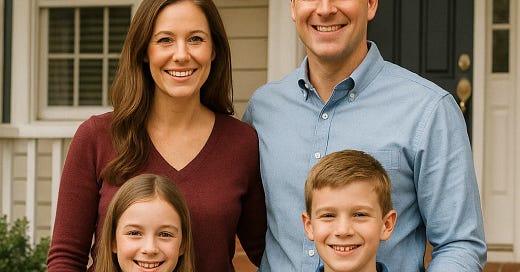By Russell G. Rednbaugh and Maximus Bernard Lewin
Daniel Waldenström’s article, The Inequality Myth, gave us a fresh perspective that genuinely surprised us. We’ve often pointed out that income inequality has doubled since LBJ, believing that the middle class was getting squeezed and that wealth was increasingly concentrated in fewer hands. But after reading Waldenström’s thorough analysis, we have to admit it looks like we’ve been wrong on this—and honestly, we’re relieved.
His data challenges the idea that inequality is spiraling out of control. Instead, he shows clearly how, when you look at the full economic picture—including homeownership, pensions, taxes, and government transfers—Western societies have become not less but more equal. Far from just the super-rich hoarding everything, middle-class families now own far more wealth in the form of their homes and retirement accounts than their grandparents ever did. In our experience we know someone who was hospitalized for a week in Los Angeles recently, and did not have to pay a penny. This hundreds of thousands of dollars of wealth redisribution shows up nowhere in most analysis of wealth inequality. Nevertheless our friend had income equivilents in an amount that might have put him in the 1%, The 5% for sure.
This perspective lines up remarkably well with many of the core ideas we’ve shared. Like us, Waldenström points out that narratives matter. He reminded us how easy it is—even for us—to fall into bad stories that reinforce victimhood and resentment rather than promoting a clear-eyed view of reality. It’s humbling, but we acknowledge we’re just as capable as anyone else of getting trapped in the wrong narrative.
Waldenström’s insight is reassuring: rather than needing drastic measures to redistribute wealth, we should focus on encouraging opportunities and rewarding ambition. As we always emphasize, policies built around envy or resentment won’t work—they’ll only stifle creativity and growth. Real, lasting progress comes from empowering people to take responsibility, invest in their own futures, and build prosperity through their own efforts.
In short, this article was eye-opening. It forced us to reexamine our assumptions about inequality and to recognize that even we sometimes buy into misleading narratives. But the good news is, the reality is far better than what we’d previously believed—and that’s a narrative we’re happy to embrace.
The Inequality Myth: Western Societies Are Growing More Equal, Not Less




Babe wake up new piss on me economic argument just dropped
A bit from The Inequality Myth: Western Societies are Growing More Equal, Not Less:
First, private wealth has exploded — but so has broad ownership of it. Reconstructed national balance sheets for France, Germany, Spain, Sweden, the United Kingdom, and the United States show real per-adult wealth roughly tripling since 1980 and rising more than sevenfold since 1950. Crucially, an increasing share of that capital sits in the homes and pension funds of ordinary households. In 1900, assets held by the elite — agricultural domains and shares in industrial or financial corporations — dominated; today, residential property and funded retirement accounts represent the majority of private assets. That shift parallels mass homeownership: in most Western countries, 60 to 70 percent of households now own the roof over their heads — an equity stake unavailable to their great-grandparents. Most workers hold pension claims in mutual funds or index funds, granting them the high returns of stock markets at low risk — what amounts to financial democratization.